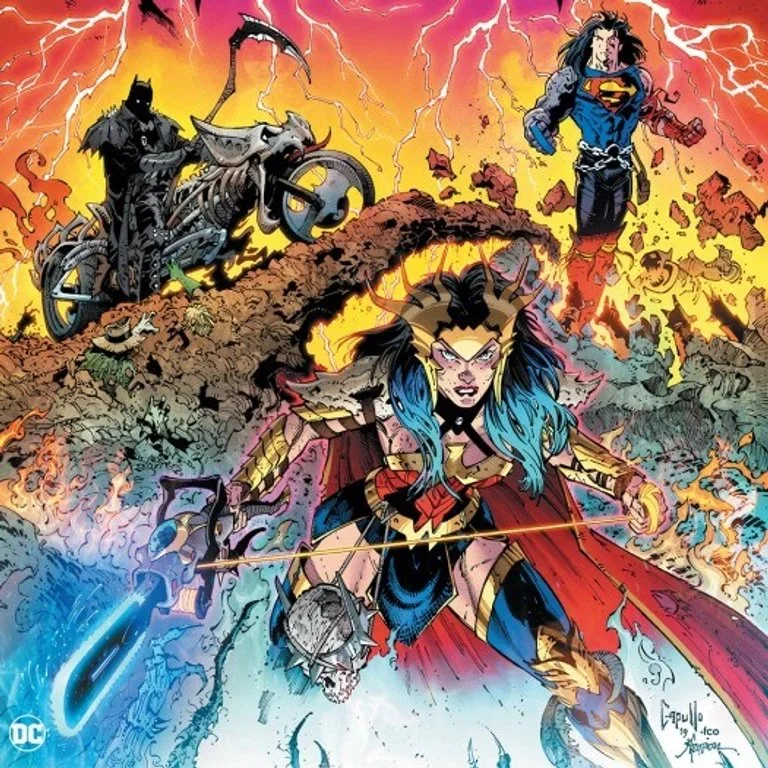Various Authors - "DC Dark Nights: Death Metal"
Superheroes and metal music: who would have thought? Well, lots of people, apparently, as the blend of gifted stock characters and the hefty offspring of rock music is anything but new or original.
Take Anthrax’s ode to Judge Dredd, for instance, or 1989’s Rock ‘n’ Roll Comics using the likes of Mötley Crüe, Frank Zappa, Metallica, Kiss and Guns ‘n’ Roses unlicensed, with the latter filing a cease and desist which ended up in the entire 10,000-copy print run selling out in a couple of weeks.
This soundtrack is the brainchild of Tyler Bates, better known as the composer of rather popular film-scores (John Wick, Dawn of the Dead and Guardians of the Galaxy to name but a few), and collaborator of people like Rob Zombie and Zack Snyder. So, yes, he knows a thing or two about the business.
Dark Nights: Death Metal, as in the comic book, instead follows 2017’s Dark Nights: Metal, a crossover mini-series written by none other than Scott Snyder and which concludes his experience with DC Comics. I have no evidence of it, but I can definitely picture Tyler Bates jump at the idea of putting together a bunch of metal artists belonging to a variety of metal sub-genres. After all, when you put Mastodon, Show Me the Body, Chelsea Wolfe and Rise Against in one place, you know that your brain is going to be stimulated left and right, so why not?
But does it work? No, it doesn’t. The end product is way too heterogenous to be enjoyed by lovers of metal or by those who do not usually listen to it. There are some real gems, don’t get me wrong (Chelsea Wolfe’s "Diana" being one of them, and HEALTH, Tyler Bates - “ANTI-LIFE” (feat. Chino Moreno) being another). The rest is, well, a tad stale.
The opener ”Forged By Neron” by Mastodon sounds like (and probably is) a b-side of any one of the band’s latest albums: yes, one of those with no real musical direction, so much so that one would expect to see them record a cover of, you know, “Stairway to Heaven”. Oh, wait…
This is outmoded music at its best. The same applies to Carach Angren and their “Skull With A Forked Tongue”, who would have saved their time and money had someone told them that Cradle of Filth did exactly the same things 20 years ago. Alternatively, the same doesn’t apply to “Now You've Really Done It” by Greg Puciato (The Dillinger Escape Plan, anyone?) and Tyler Bates himself. Or to Show Me The Body’s “Stone Cold Heart” and their noisy, sludgy geometries.
However, one good thing about these compilations is that one’s curiosity can be aroused by this or that artist, leading to something more durable than the length of the album itself. Manchester Orchestra and Soccer Mommy, for instance, who are as metal as an X Factor Christmas #1, but whose approach to melody is genuinely interesting and an intriguing addition.
Dark Nights: Death Metal is this and that but it isn’t either (death!) metal, nor a soundtrack. It is a playlist and one has to listen to it as such, not expecting surprises or groundbreaking singles.
Take “Sweat Forever”, the first single off the album, where the reassuring strumming of an acoustic guitar and the soft touch of a bass take the listener to a 90s’ feel; one inhabited by The Cardigans and the Goo Goo Dolls. “Look at me, is this what you wanted? / I'm right here, is this what you wanted? / Cross on my arm, I did it with a kitchen knife / Meant no harm, I only wanted something different”. The way these words lay out on the synth is almost cathartic, densely pure, and loosely therapeutic.
Lily Konigsberg has spent 2021 being busy - releasing a compilation of past recordings The Best of Lily Konigsberg Right Now, an album with lovely noise punks Palberta, and an EP with Nate Amos (of Water From Your Eyes fame) in which they delve further into pop and indie music. What strikes the listener is the easiness with which Konigsberg picks and chooses the various elements of pop she wants to play with. For instance, the experimentally noisy side of things is dealt with in “Bad Boy”, while a funkier stride can be found in “Alone” - but don’t let a reviewer spewing out genres with such ease fool you. The songwriting on this album is so fluid (in a pre-1995 kind of way) that every single change of direction appears natural and organic.
As for the melody, Konigsberg’s voice alone is the hook on each and every song. This is a record which mainly focuses on separation (“This album is clearly about breaking up with somebody that I love. But in all of my music, there’s humour. I don’t take myself too seriously”, she said a few weeks ago) and every song seems to work towards a partition, an emotional canyon these tunes will never be able to fill. No matter how good or bad they are.
What doesn’t work? Absolutely nothing. As someone who has lost touch with pop, I surprisingly found that it shakes the listener, it puts them in an awkward place somewhere between the fragile maturity of a talented 20-something and the unbalanced pop aesthetics of an artist in the making. Neither bad, nor excellent, this is an album which sounds like a promise. Time will tell if she will keep it, write it, or play it one day.
